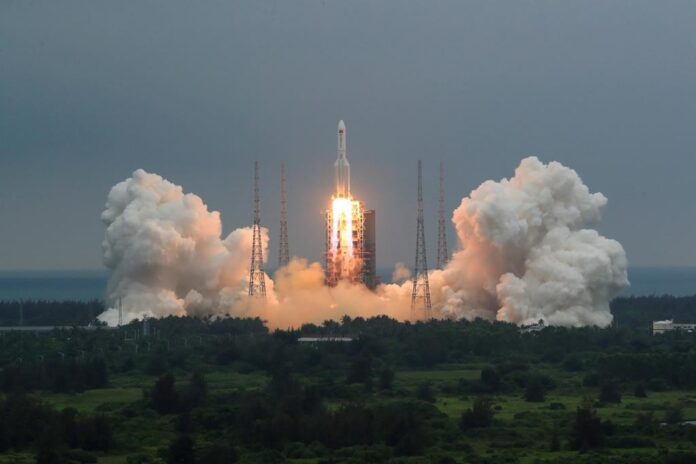Debris from a rocket that boosted part of China’s new space station into orbit fell into the sea in the Philippines on Sunday, the Chinese government announced.
Most of the final stage of the Long March-5B rocket burned up after entering the atmosphere at 12:55 a.m., the China Manned Space Agency reported. The agency said earlier the booster would be allowed to fall unguided.
The announcement gave no details of whether remaining debris fell on land or sea but said the “landing area” was at 119 degrees east longitude and 9.1 degrees north latitude. That is in waters southeast of the Philippine city of Puerto Princesa on the island of Palawan.
There was no immediate word from Philippine authorities about whether anyone on the ground was affected.
China has faced criticism for allowing rocket stages to fall to Earth uncontrolled twice before. NASA accused Beijing last year of “failing to meet responsible standards regarding their space debris” after parts of a Chinese rocket landed in the Indian Ocean.
Trending Stories
China conducts ‘live-fire’ military exercise near Taiwan, warns Pelosi not to visit
Sorry Canada: Winning ticket for US$1.337B lottery bought in Illinois
The country’s first space station, Tiangong-1, crashed into the Pacific Ocean in 2016 after Beijing confirmed it lost control. An 18-ton rocket fell uncontrolled in May 2020.
China says its rocket debris falling back to Earth unlikely to cause any harm – May 7, 2021
China also faced criticism after using a missile to destroy one of its defunct weather satellites in 2007, creating a field of debris that other governments said might jeopardize other satellites.
The July 24 launch of the Long March-5B, China’s most-powerful rocket, carried the Wentian laboratory into orbit. It was attached on Monday to the Tianhe main module, where three astronauts live.
The remains of a separate cargo spacecraft that serviced the station fell into a predetermined area of the South Pacific after most of it burned up on reentry, the government announced earlier.
© 2022 The Canadian Press



